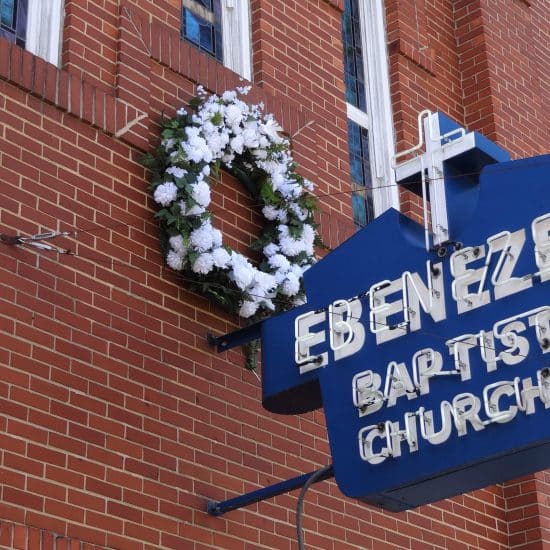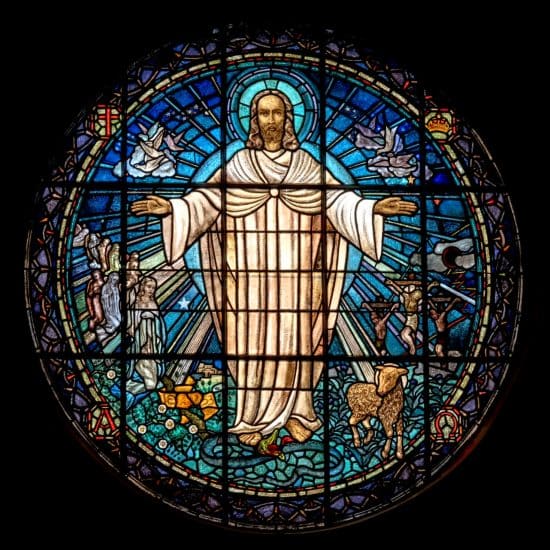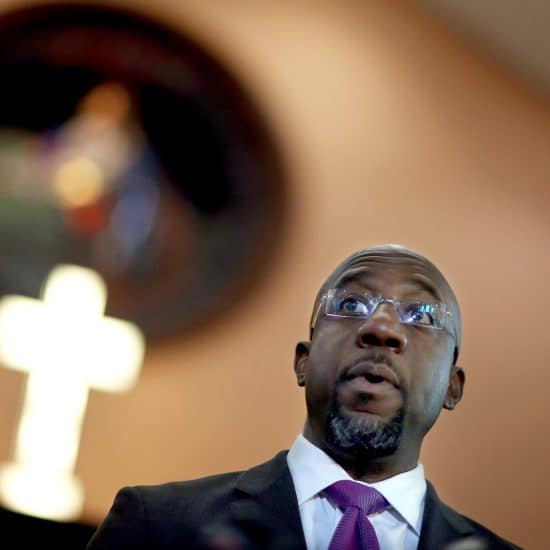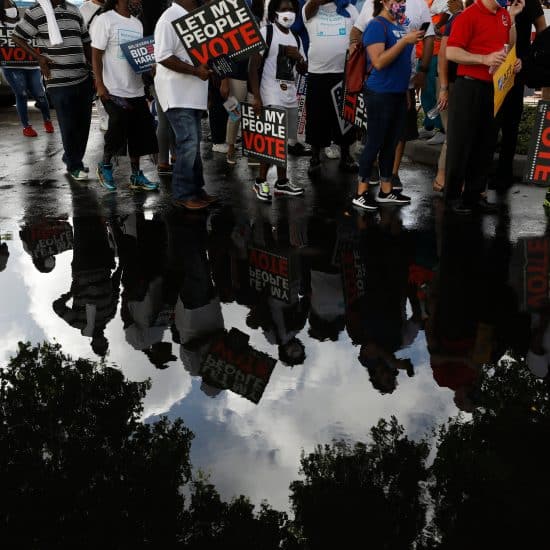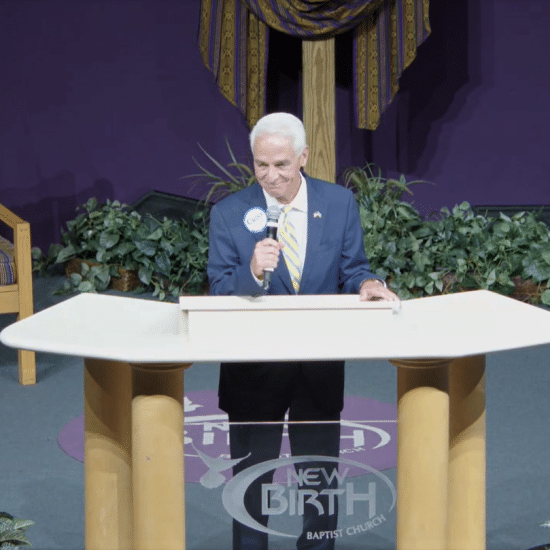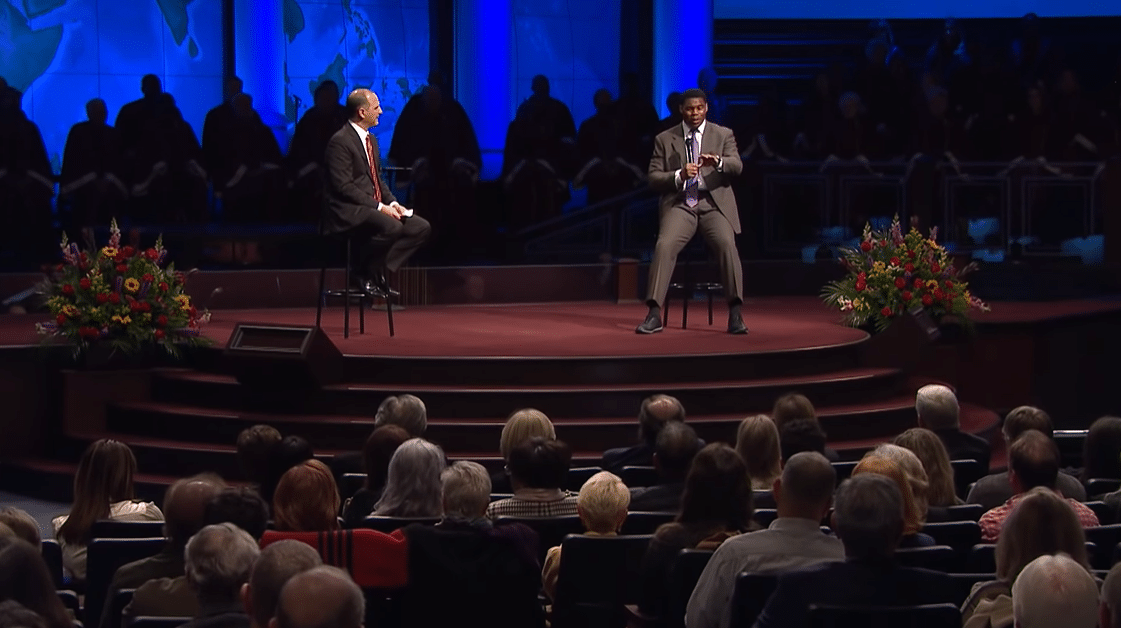
Herschel Walker is running. The greatest college football player of all time hopes to score votes as he seeks the Republican nomination for a U.S. Senate seat in Georgia. Blocking for him as he advances through the primary field are megachurch pastors who transform their Sunday morning worship services into Walker campaign rallies.
On April 3, Walker spoke during the service at Rock Springs Church in Milner. As Pastor Benny Tate interviewed him on stage, Walker also made sure people knew about his campaign. He even attacked the incumbent Democratic senator, Rev. Raphael Warnock.
“I’m running against someone that believes in abortion,” Walker declared. “I believe in life. I believe in Christ. When you believe in Christ, you’re going to do what’s right. And that’s the problem we have right now: People are afraid to mention Christ.”
“Don’t be afraid to speak his name. And that’s the reason I got in this,” Walker added. “This country’s trying to get us to get rid of Jesus, trying to get us to get rid of our faith.”
The athlete-turned-politician also hit on other hot-button political issues as he attacked people for using the “them” pronoun, teaching gender identification, or thinking they “can identify as a cat.”
“We’re in a terrible, terrible time right now when people can’t even identify a woman. It’s written in the Bible,” he said to cheering before offering his own problematic definition. “If you can’t have, you can’t produce a child, you’re a man.”
(Fortunately for women struggling with infertility, Walker’s definition reducing women to one biological function isn’t in the dictionary.)
In case anyone in the congregation missed the partisan altar call, the church’s pastor made it clear: “This is why so much I wanted to come alongside you and support you, and I believe in you.”
Tate’s no stranger to such partisan politics. He prayed at a Donald Trump primary rally during the 2016 campaign and hosted Donald Trump Jr. for a rally at the church just before the 2016 general election. So, it’s no accident that Walker showed up. In fact, Tate noted the presence of conservative religious-political activist Ralph Reed, the former Christian Coalition leader who now heads the Faith & Freedom Coalition.
And this wasn’t an anomaly. Walker has spoken during Sunday services of at least three other Georgia megachurches this year. It’s a campaign strategy that hasn’t garnered much media attention despite the large crowds. That’s why one of us (Brian) wrote a piece published this week by Sightings (a publication of the University of Chicago Divinity School on religion’s role in public life) about Walker’s Sunday politicking.
The services are fairly similar as Walker was interviewed each time by the church’s pastor. He recounted the same key moments in his life, peppering in new thoughts as the pastors mentioned different issues. So, at First Baptist Church in Atlanta, Walker talked more about race because the church’s pastor brought it up. But given the church’s history on this topic, the rhetoric warrants greater scrutiny.
 While Brian’s piece for Sightings gave a short summary of the 1963 civil rights sit-ins at FBC Atlanta as Black Christians sought to integrate the church, we’re going deeper in this issue of A Public Witness to consider that history and the theology at play — then and today. And we have exclusive comments from the leader of that civil rights effort, Rev. Amos Brown, who today is pastor of Third Baptist Church in San Francisco (the home congregation of Vice President Kamala Harris).
While Brian’s piece for Sightings gave a short summary of the 1963 civil rights sit-ins at FBC Atlanta as Black Christians sought to integrate the church, we’re going deeper in this issue of A Public Witness to consider that history and the theology at play — then and today. And we have exclusive comments from the leader of that civil rights effort, Rev. Amos Brown, who today is pastor of Third Baptist Church in San Francisco (the home congregation of Vice President Kamala Harris).
NOTE: The rest of this piece is only available to paid subscribers of the Word&Way e-newsletter A Public Witness. Subscribe today to read this essay and all previous issues, and receive future ones in your inbox.

